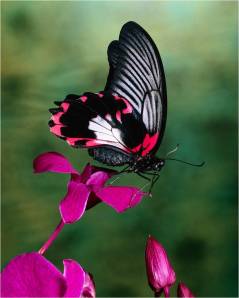
Our Bubble of Sameness
Our Echo Chamber
Insulated and Isolated
Separated and Segregated

We are so quick to shy away from and avoid anything that is disruptive to our lifestyles, our values, our beliefs.
But there is no new learning, no change,
no growth, no new perspectives without disruption.
Without disruption of the status quo, we keep on
thinking and doing the same things over and over.
And yet we keep on talking to the same people,
having the same conversations,
thinking the same thoughts,
believing what we have been told,
following the same routines and habits.
Is that really what we want???
Why do we keep on doing things
that give us the same result that we do not want?
Will we ever dare to break out?
Each year we live, layer after layer of conditioning creates a sort of cocoon where we see only what we are taught to see, hear only what we are listening for, the echo of our own voice; where we insulate and isolate ourselves from discomfort, insecurity, uncertainty, reality, truth, and the vulnerability of relationships as we sacrifice our own authenticity, identity, and integrity. After a while, we know nothing beyond our little cocoon. But that’s OK because it is safe and warm and predictable… and sleepy. We hang a sign on our cocoon, “Do Not Disturb!”
Meanwhile, “in the cocoon there is no idea of light at all, until we experience some longing for openness, some longing for something other than the smell of our own sweat.” (Chogyam Trungpa, Shambhala; the sacred path of the warrior)
The cocoon, by nature, can only be temporary, not a lifelong refuge. When we try to stay in the cocoon, it dries up and dies. In the cocoon, truth is rendered powerless and empty. Unknowingly, we bring our identity, our purpose, our religion into the cocoon with us. Layer on layer of conditioning dilutes and pollutes the vitality of compassion and peace, equality and integrity. True religion is buried with the spin of politics and commercialization of culture.
 “Real fearlessness is the product of tenderness. It comes from letting the world (touch) your heart, your raw and beautiful heart. You are willing to open up, without resistance or shyness, and face the world. You are willing to share your heart with others.”
“Real fearlessness is the product of tenderness. It comes from letting the world (touch) your heart, your raw and beautiful heart. You are willing to open up, without resistance or shyness, and face the world. You are willing to share your heart with others.”
But there is no new learning, no change,
no growth, no new perspectives without disruption.
Without disruption of the status quo, we keep on
thinking and doing the same things over and over.
And yet we keep on talking to the same people,
having the same conversations,
thinking the same thoughts,
believing what we have been told,
following the same routines and habits.
Is that really what we want???
Why do we keep on doing things
that give us the same result that we do not want?
Will we ever dare to break out?
"Humanity has been sleeping -- and still sleeps -- lulled within the narrowly confining joys of its closed loves."
Pierre Teilhard de Chardin
Meanwhile, “in the cocoon there is no idea of light at all, until we experience some longing for openness, some longing for something other than the smell of our own sweat.” (Chogyam Trungpa, Shambhala; the sacred path of the warrior)
The cocoon, by nature, can only be temporary, not a lifelong refuge. When we try to stay in the cocoon, it dries up and dies. In the cocoon, truth is rendered powerless and empty. Unknowingly, we bring our identity, our purpose, our religion into the cocoon with us. Layer on layer of conditioning dilutes and pollutes the vitality of compassion and peace, equality and integrity. True religion is buried with the spin of politics and commercialization of culture.
All we can hear is what we have been told.
All we hear is what we listen for.
All we hear is what we want to hear.
All we see is what is in our face in the dark.
All we see is what we are looking for.
All we see is what we want to see.
All we see is what is in our puny little world of our own making.
All we smell is our own sweat.
Sameness destroys disruption.
Comfortableness, security, certainty stifles disruption.
Difference and diversity nurtures disruption.
While disruption and growth destroys sameness, comfortableness, security, and certainty.
While disruption and growth destroys sameness, comfortableness, security, and certainty.
“When we hide from the world in this way, we feel secure. We may think that we have quieted our fear, but we are actually making ourselves numb with fear. We surround ourselves with our own familiar thoughts, so that nothing sharp or painful can touch us. We are so afraid of our fear that we deaden our hearts.” (Chogyam Trungpa, Shambhala; the sacred path of the warrior)
Our eyes… closed! Our ears… closed! Our minds… closed! Our hearts… closed! Our will… closed!
When will we wake up?
When will we break out?
Is there a glimmer of light, a hint of fresh air, that might pique our curiosity?
There is a whole universe out there; out beyond the walls of our puny little world.
There is a reality beyond our own making, maybe even a “God” beyond the one that we have created.
“To love at all is to be vulnerable. Love anything and your heart will certainly be wrung and possibly be broken. If you want to make sure of keeping it intact, you must give your heart to no one, not even to an animal. Wrap it carefully round with hobbies and little luxuries; avoid all entanglements; lock it up safe in the casket or coffin of your selfishness. But in that casket—safe, dark, motionless, airless—it will change. It will not be broken; it will become breakable, impenetrable, irredeemable.”
C. S. Lewis
Source: The Four Loves
C. S. Lewis
Source: The Four Loves
Let's step out of the cocoon, the casket, the coffin, and stand up into the Light.
Why so afraid to stand up?
But herein is the truth:
someone will always tell you to sit down.
The ones we remember
. . . kept standing.
(Ruth Forman)
In the book, Shambhala: The Sacred Path of the Warrior, warriorship is taught as a way of life. A warrior lives a life of fearlessness only if the person lives a life that is fully aware and fully present. The characteristic at the core of warriorship is gentleness; which comes from tenderness.
 “Real fearlessness is the product of tenderness. It comes from letting the world (touch) your heart, your raw and beautiful heart. You are willing to open up, without resistance or shyness, and face the world. You are willing to share your heart with others.”
“Real fearlessness is the product of tenderness. It comes from letting the world (touch) your heart, your raw and beautiful heart. You are willing to open up, without resistance or shyness, and face the world. You are willing to share your heart with others.”
“In the Shambhala tradition, discovering fearlessness comes from working with the softness of the human heart.” “When a human being first gives birth to the tender heart of warriorship… you no longer need to feel shy or embarrassed about being gentle. In fact, your softness begins to become passionate. You would like to extend yourself to others and communicate with them. When tenderness evolves in that direction, then you can truly appreciate the world around you. Sense perceptions become very interesting things. You are so tender and open already that you cannot help opening yourself to what takes place all around you … You begin to feel comfortable being a gentle and decent person.”



No comments:
Post a Comment